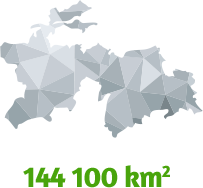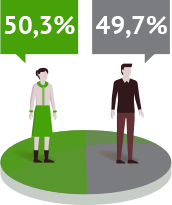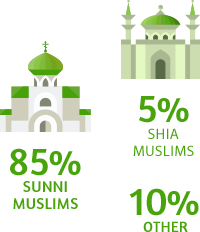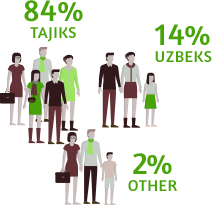What are human rights in theory; what are human rights in practice.
ABOUT THE PROJECT
The objective of the project is to develop protection for human rights and support democratic processes by working together with local civil society leaders, universities and other schools in Tajik society and by training people who work with locals. The programme, adapted to local conditions, will increase human rights awareness among third-sector partners and the citizenry and take steps to promote and protect human rights.
By working with younger people (NGO members, university and upper secondary school students), the project will encourage the target group to imagine society as one where individuals can draw on human rights for support and put modern information society to work for them in contributing to the development of society. The project activities will take place in 2016-2017.
THE HUMAN RIGHTS SITUATION IN TAJIKISTAN
The human rights situation in Tajikistan faces numerous challenges related to freedom of expression, rule of law and domestic violence, among others.
Following the collapse of the Soviet Union (USSR) in 1991, Tajikistan became an independent country with its current borders for the first time. The seismic structural changes left the country in a precarious situation, which was dramatically exacerbated when the country slid into civil war. The conflict led to thousands of deaths, economic collapse and the exodus of much skilled labour from the country. While a successful peace process did take hold, economy recovery was gradual and uneven, and the country continues to rely heavily on development assistance and remittances sent by migrants working abroad, particularly in Russia.
Tajikistan is a secular state, and the majority of its population are Sunni Muslims. In a reflection of regional, and indeed international trends, there are increasing tensions between constitutionally enshrined freedoms and attempts to control religious observance.
Opposition parties have been severely weakened in recent years, and there are several restrictions for public and civil society. The media do operate somewhat freely but struggle for a stable revenue stream, and they compete with government sponsored media outlets, which are dominant. While citizens in Tajikistan enjoy certain freedoms, particularly in comparison to neighbouring countries, there are underlying issues that need to be addressed. To take just one example, particular websites, such as YouTube and social networks, are periodically restricted. This poses a challenge to the free flow of information, even if some citizens overcome these barriers through the use of proxies.
Rule of law, arbitrary sentencing and poor conditions in prisons are also pressing issues as is the situation concerning the rights of women. In recent years, the government has introduced a number of measures to improve the situation for women, including a quota for female officials and scholarships for girls to pursue education, yet incidents of sexual harassment and gender based violence are prevalent and often go unreported, particularly those that occur in the home.
Tajikistan received 11 out of a total of 100 points in the 2017 Freedom in the World index (in comparison, Estonia scored 94). The index rated the state of human rights and civil liberties in Tajikistan as very poor and the country as falling into the ‘not free’ category.
PROJECT PARTNERS

WHAT IS DEVELOPMENT COOPERATION
Development cooperation is a general term that includes both financial aid aimed at developing countries as well as know-how (technical assistance) and material assistance. Development cooperation is implemented in bilateral and multilateral cooperation formats.
Read more




















